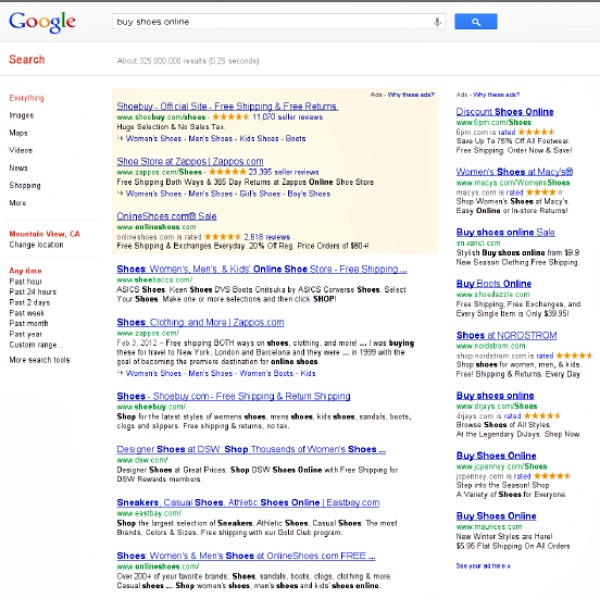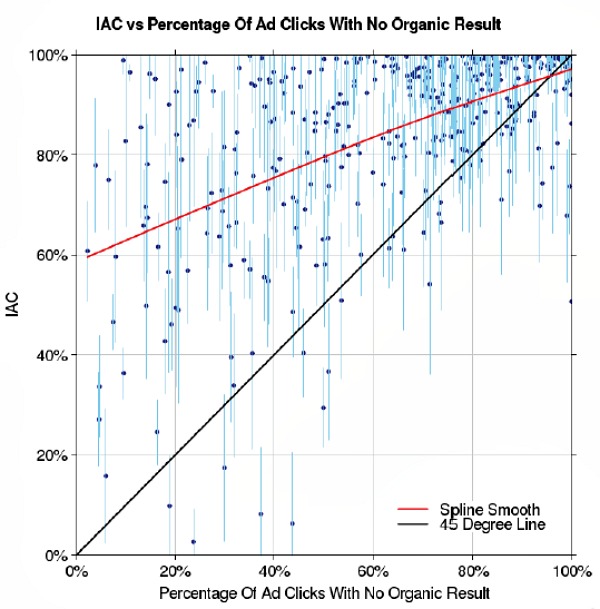A new Google study examining the impact of organic listings on ad click incrementality finds that the click-through rates (CTR) of ads with associated organic search results are higher and that the CTR increased the higher the organic result was positioned.
Though 66 percent of ad clicks occurred without an associated organic result on the page, it is worth turning that on its head; this means 34 percent of paid search clicks happen with an organic result by the same advertiser on page. If ranking on the first page organically in these instances can help ad performance as well, that’s something to consider.
This research built upon their findings from a previous Google study, which showed that 89 percent of the traffic generated by search ads isn’t replaced by organic clicks when ads are paused.
This particular study series was born in response to advertiser concerns that paid search ads could be cannibalizing their organic traffic. It’s a legitimate worry; are you throwing money away by paying for clicks when an organic result could have earned that click instead? Marketers may be hesitant to bid on terms they already rank for organically.
To solve that question, Google used “Search Ads Pause Studies” to evaluate organic performance in the absence of PPC ads. Only 11 percent of traffic was replaced by organic clicks when they paused test search ad campaigns.
This time, Google set out to find out how often a paid search ad accompanied an organic listing for the same website and how the incrementality of ad clicks varied with the rank of the advertiser’s organic result.
81% of Displayed Search Ads Have No Associated Organic Result

In their analysis of 390 separate Search Ads Pause Studies over a six month period, Google found that 81 percent of the search ads displayed had no corresponding organic result on the first page of results.
Of those that did have both a paid search and organic listing:
- 9 percent of search ads had an associated organic listing in the No. 1 position.
- 5 percent had an associated organic listing in the range of positions 2 to 4.
- 4 percent had an associated organic listing in position 5 or lower.
The main takeaway, said Google, is that the opportunity for organic clicks when ads are turned off is limited. For marketers, this could also highlight an opportunity to target organic positions corresponding with their paid search terms. If you’re spending on ads to target specific terms, what are the challenges in ranking organically for those terms?
Average PPC Ad Position is Lowest with No Corresponding Organic Result

So far, we know that organic doesn’t replace very much traffic at all when search ads are paused and that people are still clicking ads when there is no organic result from the same advertiser on the front page. We also know that ad clicks still happen when there is an organic result displayed, so the user is choosing the paid search ad instead.
Next, Google set out to determine whether ad positioning was affected by the presence (or lack thereof) of an associated organic result on the first results page. Google’s study found that the average ad position was lowest when there was no organic result from that advertiser. Conversely, average ad position was higher when an associated organic result was present, and highest when that organic result was in the No. 1 position.
Key Findings and Recommendations for Marketers
Google’s study is a tough, technical read and not for the faint of heart. Google obviously has a vested interest in selling advertising; as with any research, it’s important to consider the source.
However, Google is open about their methodology throughout the report and encourages marketers to test the theories themselves. Overall, the report offers a number of useful insights.
It boils down to:
- 99 percent of ad clicks with no associated organic result are incremental.
- 50 percent of ad clicks with an associated No. 1 organic result are incremental.
- 82 percent of ad clicks with an associated No. 2 to No. 4 organic results are incremental.
- 96 percent of ad clicks with an associated organic result ranking No. 5 or lower are incremental.
What does all of this mean for you? Google recommends that advertisers use value-per-click calculations to help decide how much to spend on branded terms, given their typically high organic rank. They also suggest that marketers use their own randomized experiments, such as geo-based experiments, to better quantify ad clicks that are not replaced by higher ranking organic results.
Rather than pitting paid search and organic against one another, it may be necessary to take into account the benefits higher organic rankings may have on PPC performance as much as that organic can’t always replace PPC. Good SEO will help marketers rank higher over a longer period of time while the benefits of paid search are instant. When asking for SEO budget, be sure to mention how it could help the performance of your PPC campaign.
If you have done any testing in this area, let us know in the comments.

